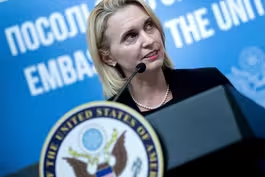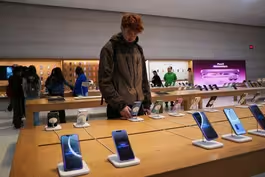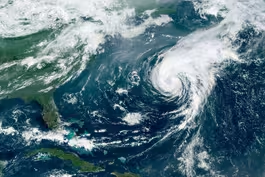
Dawn Staley reflects on successes and challenges in new book
Clip: 5/23/2025 | 7m 42sVideo has Closed Captions
Basketball legend Dawn Staley reflects on successes and challenges in 'Uncommon Favor'
Dawn Staley is a woman of many titles: five-time WNBA all-star, Olympic gold medalist, head coach and now an author. In her first book, Staley reflects on the lessons that made her who she is today. Amna Nawaz spoke with Staley about her love of basketball and her new memoir, "Uncommon Favor: Basketball, North Philly, My Mother, and the Life Lessons I Learned from All Three."
Problems playing video? | Closed Captioning Feedback
Problems playing video? | Closed Captioning Feedback
Major corporate funding for the PBS News Hour is provided by BDO, BNSF, Consumer Cellular, American Cruise Lines, and Raymond James. Funding for the PBS NewsHour Weekend is provided by...

Dawn Staley reflects on successes and challenges in new book
Clip: 5/23/2025 | 7m 42sVideo has Closed Captions
Dawn Staley is a woman of many titles: five-time WNBA all-star, Olympic gold medalist, head coach and now an author. In her first book, Staley reflects on the lessons that made her who she is today. Amna Nawaz spoke with Staley about her love of basketball and her new memoir, "Uncommon Favor: Basketball, North Philly, My Mother, and the Life Lessons I Learned from All Three."
Problems playing video? | Closed Captioning Feedback
How to Watch PBS News Hour
PBS News Hour is available to stream on pbs.org and the free PBS App, available on iPhone, Apple TV, Android TV, Android smartphones, Amazon Fire TV, Amazon Fire Tablet, Roku, Samsung Smart TV, and Vizio.
Providing Support for PBS.org
Learn Moreabout PBS online sponsorshipAMNA NAWAZ: Dawn Staley is a woman of many titles, five-time WNBA All-Star, Olympic gold medalist, head coach, and now an author.
In her first book, Staley reflects on the lessons that made her who she is today, from growing up in the projects of North Philadelphia, to college stardom, to being a WNBA pioneer, and an architect of an NCAA powerhouse at South Carolina.
The memoir is called "Uncommon Favor: Basketball, North Philly, My Mother, and the Life Lessons I Learned From All Three."
I spoke recently with Staley and asked her about first discovering her love of the game.
DAWN STALEY, Author, "Uncommon Favor: Basketball, North Philly, My Mother, and the Life Lessons I Learned From All Three": Basketball was everything to me, but when I look back on it, being the youngest of five, you grow up in a household where you don't really have a perspective or an opinion because you're the youngest, and no one's listening.
And then, when I picked up a basketball, it really was a love affair.
I found my identity playing the game, like, people saw me.
Like, they really saw me for who was, whether that was a girl playing with all boys or whether there was a girl that was tough, a girl that didn't back down.
There was a light shined on my life.
And it was -- it's in a weird way that I felt that.
But that light has never dimmed.
And it's all because of the game that I fell in love with.
AMNA NAWAZ: You're so honest about the challenges you faced along the way too, about it being a tough adjustment from Philly to UVA, and then again a tough adjustment when you're playing overseas.
There's a great story about Kid 'n Play and the "House Party" movies I won't get into here, but a lot of folks know you from that big moment in the 1996 Olympic Games, the women's Dream Team you were on with all those legends of the game of, Sheryl Swoopes, and Lisa Leslie, and Teresa Edwards.
There was a lot of pressure on you then, because we knew, if that team didn't win gold, there would be no professional women's team on the back end.
You write about that and you say: "We feared the promise of stateside professional women's basketball would die on the vine" if you flopped.
After carrying that burden, what was it like to feel that gold medal around your neck?
DAWN STALEY: We didn't get gold in the '92 Olympics.
We had to win gold in '96 because we were hosting.
We had the win gold because they told us almost halfway through the training of the U.S. national team that the WNBA was going to start a league.
The ABL was going to start a league.
And we felt the weight of women's professional basketball during that time.
And we felt like -- we had to we had to ace the '96 Olympic Games with winning gold, or else people would question whether or not women's basketball could be a mainstay.
And looking back on the history of the game, I'm so happy to be a part of that team, because we are still ambassadors of the game.
And I hope that the youngsters that are playing the game today really understand what was at stake just 29 years ago.
AMNA NAWAZ: I mean, the league would not exist and it would not be where it is today without you and that team back then.
What is it like for you to see that arc, to see what it's become today?
DAWN STALEY: It feels normal, which is a great thing.
Like, it feels like this is what we're supposed to be doing.
Me going to college, I should have naturally gone right into the WNBA.
But that wasn't the case.
But I'm glad it's happening through -- during my -- like, I can feel it.
I can see it.
I can see it continuing to grow.
AMNA NAWAZ: Your success on the court has been surpassed by your success as a coach.
You have built South Carolina into a blue blood powerhouse now.
But you talk a lot about the fact that there are not enough Black coaches in the game, despite the abundance of Black players and Black stars playing the game.
Why is that?
What needs to change?
DAWN STALEY: Well, what needs to change, and I do speak about it in "Uncommon Favor," is the decision-makers.
Like, I hope that I represent a portion of Black coaches that could be super successful in our game.
Like, someone took a chance on me 25 years ago.
I had zero coaching experience.
All of my experience was playing.
I'm sure, at this stage of the game, there are a lot of Black coaches out there that have more, like way more experience than I did 25 years ago.
They only need a chance.
And I would say that, like all of us, if I have a -- if I have someone to hire, yes, I'm going to reach into my personal Rolodex and I'm probably going to go through and see who have I worked with, who comes highly recommended?
And it is probably going to be a Black person, only because that's who I hang out with.
That's who I know, right?
It will take somebody else to give me another name that I didn't know for me to take a chance on.
I think decision-makers will have to stretch themselves a little bit.
And we have to be less probably lazy about gathering lists of people that you can draw on, you know, if you have an opening.
I'm talking about A.D.s, I'm talking about presidents, I'm talking to anybody that's going to be a part of the decision-making in deciding who's going to be your women's -- your head women's basketball coach.
AMNA NAWAZ: Central to your story is your faith, which, as you share, is instilled in you by your late mother, Estelle Staley.
This idea too of a purposeful life, you talk about a lot.
You write that you want a life that means something.
So I got to ask, at this stage of your life, at this age, looking forward now, what does that look like for you?
DAWN STALEY: You mentioned my mother, Estelle Staley.
Like, my mother lived for the church.
She lived for, every time the church door opened, she was working in the vineyard.
I mean, four to five times a week, she was at church.
Like, I saw her purpose, I saw what made her happy.
And that grew on me.
Of course, I'm not working in the vineyard as much as my mother, but basketball and being a dreamer is my vineyard.
It really is, like, the players that I get a chance to coach, the families that I get a chance to impact.
And, hopefully, I impacted so much that their generation would change.
I coach first-generational college graduates.
Do you know the impact that that has on a family and the generations that come after that?
Like, that is my purpose in life.
That is what I am supposed to be doing in.
And, hopefully, I'm fulfilling the debt that I owe basketball, because I owe basketball an incredible debt that I can't seem to pay down, because it keeps on giving me more and more.
AMNA NAWAZ: The book is "Uncommon Favor."
The author is coach Dawn Staley.
Coach, always great to talk to you.
Thank you for making the time.
DAWN STALEY: Thank you so very much.
Brooks and Capehart on Trump's legislative agenda
Video has Closed Captions
Clip: 5/23/2025 | 10m 39s | Brooks and Capehart on House Republicans passing Trump's legislative agenda (10m 39s)
Ex-U.S. ambassador to Ukraine explains why she resigned
Video has Closed Captions
Clip: 5/23/2025 | 7m 7s | 'We're playing into Russia's hands': Ex-U.S. ambassador to Ukraine on why she resigned (7m 7s)
News Wrap: Trump threatens tariffs on EU imports and iPhones
Video has Closed Captions
Clip: 5/23/2025 | 5m 39s | News Wrap: Trump threatens new tariffs on EU imports and iPhones (5m 39s)
NOAA cuts make it harder to prepare for severe weather
Video has Closed Captions
Clip: 5/23/2025 | 6m 59s | How NOAA funding cuts could make it harder to predict and prepare for severe weather (6m 59s)
Trump event with crypto customers fuels concerns
Video has Closed Captions
Clip: 5/23/2025 | 6m 39s | Private event with crypto customers fuels accusations of Trump profiting off presidency (6m 39s)
What Trump's clash with Harvard means for higher education
Video has Closed Captions
Clip: 5/23/2025 | 6m 43s | What Trump's legal and political clash with Harvard means for higher education (6m 43s)
Providing Support for PBS.org
Learn Moreabout PBS online sponsorshipSupport for PBS provided by:
Major corporate funding for the PBS News Hour is provided by BDO, BNSF, Consumer Cellular, American Cruise Lines, and Raymond James. Funding for the PBS NewsHour Weekend is provided by...

















